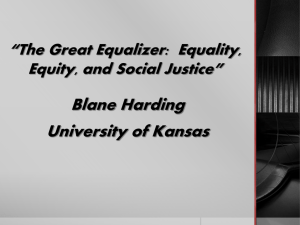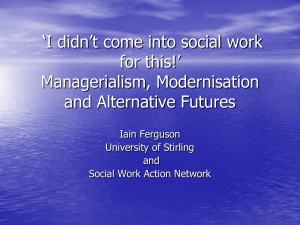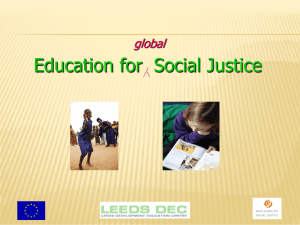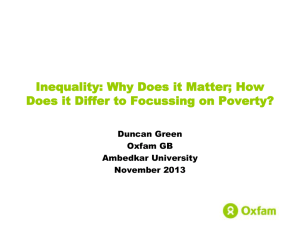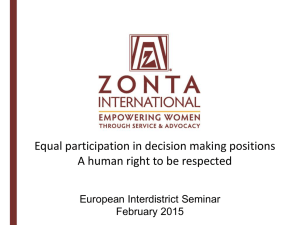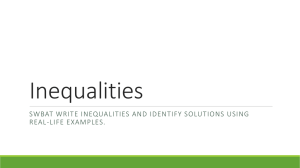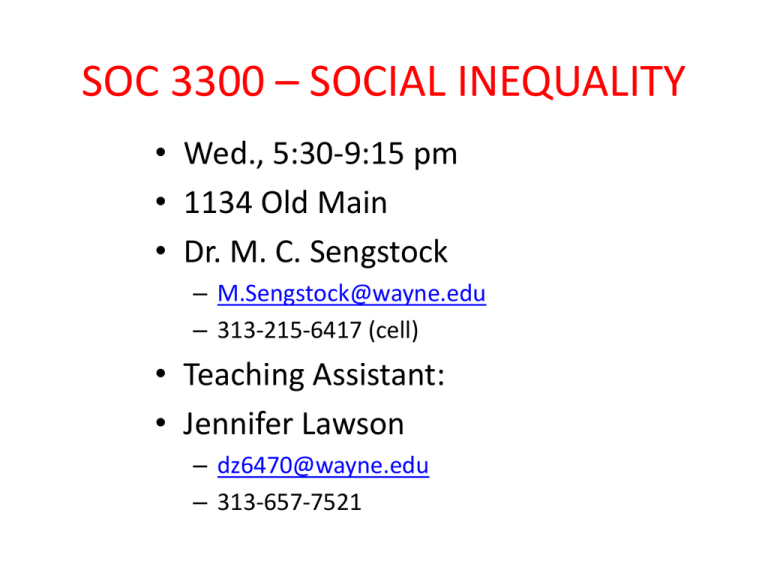
SOC 3300 – SOCIAL INEQUALITY
• Wed., 5:30-9:15 pm
• 1134 Old Main
• Dr. M. C. Sengstock
– M.Sengstock@wayne.edu
– 313-215-6417 (cell)
• Teaching Assistant:
• Jennifer Lawson
– dz6470@wayne.edu
– 313-657-7521
COURSE DESCRIPTION (rev’d)
• SOC 3300. Social Inequality. Cr. 4.
– Analysis of inequalities in society …
– due to race, gender, cultural differences.
– Focus on how inequality is maintained…
– the experience of discrimination…
– their impact on society …
– and institutions:
• Economy – government – religion – family
• And Individuals
TEXTBOOK
Tracey E. Ore, Ed.
The Social Construction Of Difference and
Inequality: Race, Class, Gender, and Sexuality.
Current Edition.
New York: McGraw-Hill.
OTHER READING MATERIALS
Vincent N. Parillo, 2006.
Strangers to These Shores. (8th Edition)
Boston: Pearson
Mary C. Sengstock, 2009.
Voices of Diversity.
New York: Springer.
All Books Are on Special Reserve in Undergraduate Library.
OBJECTIVES – TO UNDERSTAND:
•
•
•
•
Societal Structure/Social Institutions
Nature of Prejudice & Discrimination
Their Impact on Individuals/Society
Inequalities – Prejudice – Discrimination
– How/Why They Develop
– How/Why They Are Maintained
COURSE REQUIREMENTS
• Exams – Both Multiple Choice:
– Mid-Term
&
Final Exam
– Extra Credit for Submitting Exam Questions
• Class Presentation (10 Minutes)
• On Some Aspect of YOUR Personal Experience with Inequality
• YOUR RESPONSIBILITY TO SCHEDULE!
• Term Paper
–
–
–
–
–
–
3-4 Pages – 3 References
MUST Be Academic (Not “Popular”) Citations
No Web Citations!
Review of Literature on Relevant Topic
Will Have Extra Discussion on How to Write a Paper!
Due Wed., 3/20/13 – YOUR RESPONSIBILITY!
Questions?
Issues?
INEQUALITY
• Varying Ways People Are Treated & Defined in Society
• Ways Sociology Has Dealt With These Issues
• Formerly: 2 Separate Issues
– Socio-Economic Class – Economic Inequality
– Race & Ethnic Inequality
• Today: Broad “Umbrella” – Varies with the Society:
“Inequality”:
– Economic – Race – Gender
– “Ethnic” (Nationality – Cultural – Religion – Gender)
– Other??
CHANGING VIEWS OF
INEQUALITY IN SOCIOLOGY
• Change of Definition & Treatment in Sociology
• Former: 2 Separate Issues
– Socio-Economic Class – Economic Inequality
– Race & Ethnic Inequality
• Today: Broad “Umbrella” – Varies with the
Society:
– “Inequality”:
– Economic – Race – Nationality – Religion – Gender
– Other??
KEY ISSUES IN INEQUALITY
•
•
•
•
•
Who Gets the “Goodies”?
Who’s Left Out?
Who Decides?
How is System Perpetuated – Mechanisms?
What Mechanisms for Change Exist?
3 MAJOR ISSUES
• Defining Differences: How Societies Define
Which Characteristics Are Important to
Evaluate & How They Evaluate Them
• Determining Inequality: How Societies Decide
Which Differences Lead to An Unequal
Position in Society
• Developing a Stratification Structure: How
These Differences Are Used to Develop an Ongoing Social Structure Over Time
ORE’S MAJOR POINTS
• Source of Our Construction of Differences:
• Biological Differences:
– Skin Color; Sex; Age; Physical Size; Hair Color;
Physical Disabilities; Blood Types
• Do We Use These? Some of Those Used:
– Skin Color; Sex; Age (Sometimes)
• Do We Ignore Others?
– Physical Size (Except Extremes – “Little People”;
Giants); Hair Color; Blood Types; Facial Shapes
SOCIAL vs. BIOLOGICAL ASPECTS
• What Society/People Define as the Important
Issues
• May Not Be Biological At All:
– Early U.S. History:
– Distinctions Between Original Founding English
(Puritans, Pilgrims) – And Everybody Else:
– Scots, Welsh – Protestants from British Isles
– Later: Irish – Especially!
• WHY? What Made Them REALLY Different?
SOCIAL DEFINITIONS – RARELY
ALLOW VARIATIONS
• EX: “RACE” in U.S. History
• “Hypo-descent”:
– “Hypo” Means “Less Than”
• EX: “Hypoglycemia” vs. “Hyperglycemia”
• EX: Pres. Obama; Jefferson’s child(ren) by Sally
Hemings – ANY Black Ancestry Defines One As “Black”
• Will Examine Examples from My Study of
“Mixed Background” People
– Focus on Variety of Dimensions: Race, Religion, Nationality
DIFFERENCE: ALWAYS NEGATIVE?
• Is Difference Always Negative?
– Only If It Is Viewed As Such
– EX: Skin Color; Sex (Gender); Physical Disability
– What Is the Difference Between SEX & GENDER
• A SOCIAL Definition – Not Necessarily Biological (Sexual
Orientation)
• What Things Do We Choose to Define As Different?
• When Can It Be Positive?
– Differences in Music, Food, Personality
QUESTIONS WE WILL STUDY:
• HOW Do We Construct Categories of
DIFFERENCE regarding:
• Race – Ethnicity – Sex/Gender – Sexuality –
Social Class?
• WHAT Creates These Categories?
• HOW Are They Constructed?
• WHY Are They Created?
• INTERSECTIONALITY – How Do They
Interrelate? (I.e., “Intersect”)
CONSTRUCTING STRATIFICATION
• What Is “STRATIFICATION”?
• A System of LEVELS in a HIERARCHY – From
Higher to Lower or Vice Versa
• How Do Social Categories Turn into a System
of “STRATIFICATION” ?
• How Do Societies Define Who Is “Higher” &
Who is “Lower”?
CRITICAL COMPONENT OF
ANALYSIS
• What is Necessary to Do This Kind of Analysis?
CRITICAL THINKING
• Need To Examine the Ways In Which Our
Social Structure AFFECTS US:
– Our VALUES
– Our ATTITUDES
– Our BEHAVIORS
– OUR ASSUMPTIONS
COMPONENTS OF CRITICAL
THINKING
• Does NOT Mean Giving Up Our Values/Beliefs
• Does NOT Require That We Accept A New One
• It DOES Require That We:
– Identify & Challenge ASSUMPTIONS
– Understand Our “STANDPOINT”
– Understand ENCULTURATION & ETHNOCENTRISM
– Consider Validity of “CULTURAL RELATIVISM”
– Consider Validity of “CIVIL RIGHTS”
– Develop a “REFLECTIVE ANALYSIS”
IDENTIFYING/CHALLENGING
ASSUMPTIONS
– Identify & Challenge ASSUMPTIONS
– Understand Our “STANDPOINT”
– Understand ENCULTURATION & ETHNOCENTRISM
– Consider Validity of “CULTURAL RELATIVISM”
– Consider Validity of “CIVIL RIGHTS”
– Develop a “REFLECTIVE ANALYSIS”
IDENTIFY AND CHALLENGE
ASSUMPTIONS
• What Are Assumptions?
• Ideas That We Accept Uncritically Because of
Our Society, Culture, Socialization (Upbringing)
• Generally We Do Not Question These Ideas –
They Are Simply Accepted As True
• These Assumptions Are Used to Observe &
Evaluate Everyone Else & THEIR Values, Ideas,
Behavior, & Culture
UNDERSTANDING OUR
STANDPOINT
• What Is a “STANDPOINT”?
• Everyone’s Assumptions About
Values/Beliefs/Ideas/Assumptions About
“Proper” Behavior Come From His/Her Place
in Society and The Culture S/He Learns
• Everyone Evaluates the World – & Other
People – From That Perspective
• WE NEED TO KNOW WHAT THIS STANDPOINT
IS & HOW IT AFFECTS OUR VIEW OF OTHERS.
ENCULTURATION &
ETHNOCENTRISM
• “ENCULTURATION”: Everyone Is Taught the
Perspective of Her/His Culture
• Everyone Accepts This Perspective Uncritically
• “ETHNOCENTRISM”: Everyone Evaluates the
World From the Perspective of This Culture of
Origin
• EX: Americans Evaluate Others on the Basis of Our
American Values – And They Do the Same of US!
– British Are “Stuffy” – Americans Are “Too Wild”
ETHNOCENTRISM
• Evaluating Others On the Basis of One’s Own
Values Is Natural
• It Becomes Unfair When It Is Used As the Basis
for Unequal Treatment of Others
• EX: Religious Ideas & Values:
– May Be Different From Our Own
– Should Not be Viewed As “Evil”
– Nor As the Basis for Unequal Treatment of Others
– EX: U.S. Settlers’ Treatment of Native Americans
CULTURAL RELATIVISM
• Recognizing that Everyone’s Perspective Is
Related to Her/His Own Culture
• Hence Each Person’s Perspective Is Valid
WITHIN THE CONTEXT OF THAT PERSON’S
OWN CULTURE & VALUE SYSTEM
• Each Person Has a Right to View The World in
His/Her Own Way
• Just As We Have the Right to View It Our Way
• We Should All Respect Each Other’s Right to
Do So
CONSIDER VALIDITY OF
CIVIL RIGHTS vs.HUMAN RIGHTS
• U.S. CIVIL RIGHTS:
• Government Assumes Will of Majority Rules for ALL
• Greatest Good For Greatest Number
• E.g., Some Will Be Left Out
• HUMAN RIGHTS:
• Assumption That Every Person Is Equal & Valuable
• So ALL Are Entitled to Certain Benefits
• E.g., Food, Clothing, Shelter, Health Care
DEVELOP A PERSPECTIVE OF
“REFLECTIVE ANALYSIS”
• Develop the Ability to Consider Whether
Other People’s Assumptions – Though
Different – May Be Equally Valuable – FOR
THEM – If Not For You
• EX: You Do Not Have to Share Another
Person’s Religious Beliefs In Order to Accept
their Right to Hold & Practice Those Beliefs –
As Long As They Accord You the Same
Privilege
LOOKING FORWARD:
NEXT SEVERAL CLASSES
•
•
•
•
•
•
We Will Begin With Tracey Ore’s Book (Pt. I)
Understanding the Meanings of Inequality
Understanding the Major Types of Inequality
Looking At Ways Inequalities Develop
Looking At WHY They Develop
Looking At Their Impact on Society, Individuals
FOR THIS EVENING:
YOUR EXPERIENCES
• Introduce Yourselves:
–
–
–
–
Name, Approx Age, Background (Where Born? Live?)
Do You (Have You) Worked? Kind of Job?
Occupational Goals?
Why Taking This Class
• Describe Your Own Views of Inequality
– IF YOU ARE COMFORTABLE DOING THIS!
– Ever Experienced Inequality? Observed It?
– What Do You Think Causes It?

